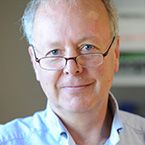
Internationally celebrated for his discoveries related to DNA methylation and its role in gene expression, Dr. Bird has conducted pivotal research that has been essential to the understanding of how various DNA methylation marks and chromatin modifications are capable of inducing global gene regulation in various disease states, including cancer. He is credited with discovering and characterizing CpG islands, short genomic regions consisting of CpG dinucleotides commonly found within or near a gene ‘s promoter region. Likewise, he is recognized for discovering several methyl-CpG-binding domain proteins, including MECP2 (methyl CpG binding protein 2), and for demonstrating that these proteins function to regulate gene expression by binding to methylated genes.
His work involving MECP2 has been particularly important to the understanding of the autism spectrum neurological disorder, Rett syndrome. Dr. Bird discovered that select MECP2 mutations are directly correlated with Rett syndrome onset. He was the first to generate a mouse model of Rett syndrome and has since conducted landmark experiments involving these models whereby he has demonstrated the ability to reverse key symptoms associated with Rett syndrome by recovering MECP2 function.
Dr. Bird ‘s research into understanding DNA methylation patterns and CpG island signaling has been vital to the ongoing pursuit to define the critical roles of post-translational modifications such as methylation and demethylation in the onset and progression of many diseases, including cancer.
Career Highlights
2017 Charles Rodolphe Brupbacher Prize for Cancer, Zürich, Switzerland
2016 Elected Foreign Associate, National Academy of Sciences, Washington, D.C.
2016 Shaw Prize in Life Science and Medicine, Hong Kong
2014 Knight Bachelor of the British Empire (New Year’s Honours List)
2014 Jacob’s Ladder Norman Saunders International Research Prize, Toronto, Canada
2014 BBVA Foundation Frontiers of Knowledge Award, Madrid, Spain
2011 Canada Gairdner International Award
2008 Grand Prix Charles-Léopold Mayer, French Academy of Sciences
2005 Commander of the Most Excellent Order of the British Empire
2001 Elected Fellow, Academy of Medical Sciences, London, United Kingdom
1999 The Gabor Medal, The Royal Society, London, United Kingdom
1999 Louis-Jeantet Prize for Medicine, Geneva, Switzerland
1994 Elected Fellow, Royal Society of Edinburgh, Scotland
1989 Elected Fellow, The Royal Society, London, United Kingdom
[Institutional affiliations listed for Fellows reflect those held at the time of their induction into the AACR Academy.]